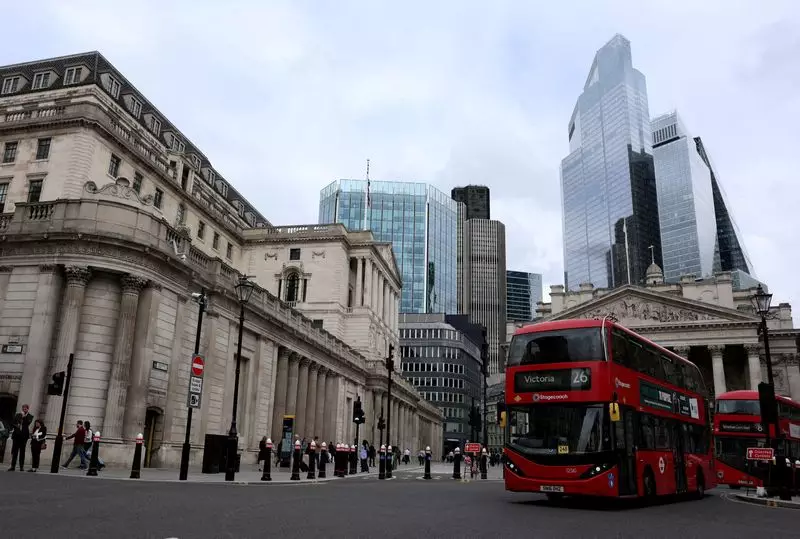In recent months, the UK has become familiar with the concept of bond vigilantism, a phenomenon characterized by investors’ heightened scrutiny of government fiscal policy. As Chancellor of the Exchequer Rachel Reeves grapples with increasing pressures on the nation’s finances, it appears that her administration may soon face the unenviable choice between politically unpalatable tax increases and significant public spending cuts. This precarious situation is further complicated by the actions of the Bank of England (BoE), which, despite recent market fluctuations, is still actively selling government bonds, a shift that continues to reverberate through the financial markets.
The early weeks of 2025 witnessed a dramatic spike in gilt yields, reaching levels unseen since the turbulent financial landscape of 2008. Although yields have slightly decreased following unexpectedly low inflation figures in December, concerns remain that the UK bond market will continue to experience instability. The global rise in government bond yields—especially in the United States—compounded by fears surrounding potentially inflationary policies from U.S. leadership, has left UK investors uneasy. In particular, there is anxiety surrounding the new Labour Government’s approach to fiscal management. Many investors worry that its policies could exacerbate debt levels without effectively stimulating economic growth, leading to further volatility in the bond market.
In a departure from its past practices, the BoE has embarked on a ‘quantitative tightening’ program. Historically seen as the cornerstone of economic stability, the bank is now actively selling off its gilt holdings after having served as a principal buyer in the market for years. The bedrock of the gilt market—valued at approximately £2.6 trillion—has entered a new phase. As the BoE reduces its holdings from nearly £900 billion to an anticipated £560 billion by September, this rapid offloading raises questions of liquidity and investor confidence. The expectation is that the UK will issue roughly £300 billion in gilts annually over the next two years, while the Bank of England aims to cut its bond stockpile by £100 billion—essentially impacting supply and influencing yields promptly.
This confluence of factors poses significant challenges for Chancellor Reeves. Currently, annual interest payments on government debt stand at £105 billion; should yields continue to rise, this figure may grow, effectively constraining the government’s ability to invest in economic initiatives. For Reeves, a reduction in BoE gilt sales could relieve some pressure by reducing the available supply of bonds, consequently lowering yields. However, with clear communication from the BoE indicating its intention to pursue its current course of action, a complete halt in sales seems unlikely.
If the BoE opts to adopt a more passive approach—ceasing reinvestment of maturing bonds while adjusting selling rates—it could mitigate some negative impacts on the market. Some analysts project that by delaying certain sales, the BoE could lessen the burden on gilts, allowing for a more gradual adjustment to market conditions.
In comparison to the tumultuous events of 2022, when former Prime Minister Liz Truss presided over significant market chaos, the current situation is manifestly different. Chancellor Reeves has clearly articulated her commitment to maintaining the independence of the BoE and the Office for Budget Responsibility. This distinction is vital; any indication of political interference could lead to a tsunami of investor skepticism. The BoE needs to tread carefully, ensuring that any actions it takes are justified by market conditions rather than political pressures.
To this end, the BoE has stated that it is intently monitoring the market dynamics. While Deputy Governor Sarah Breeden confirmed that stability is not currently a concern, the central bank must remain vigilant. The question of whether the BoE will modify its quantitative tightening approach looms large, especially in light of the criticism it faced during previous fiscal stimulus actions during the COVID-19 pandemic.
The UK faces a pivotal moment within its bond market, influenced by a myriad of domestic and global factors. As the government seeks to navigate fiscal challenges, its actions must strike a delicate balance. Both the BoE and the Exchequer have roles to play in ensuring that investor confidence is preserved while crafting policies that foster economic growth. The coming months will be critical in determining whether the lessons of past controversies have been learned or whether the specters of bond vigilantism will plague the nation’s financial landscape once again. As the BoE carries out its quantitative tightening and Reeves confronts distortions in the bond market, all eyes will be on how these leaders execute their plans in this uncertain economic environment.

